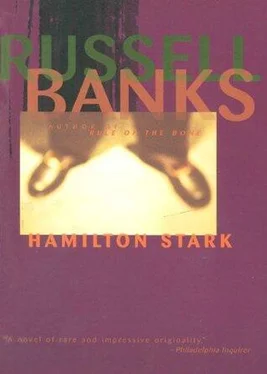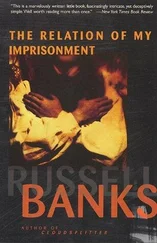“How’s that again?”
“Eh? A shame. I said it’s a shame that she considers her few months with A. as she would a bad dream.”
“Well, if you asked me, and I’m beginning to think that you wouldn’t, but if you asked me, I’d tell you that I think she’s damned fortunate to be able to think of it as a bad dream. She’s lucky to be able to think at all!”
“Wha…?”
“The man’s dangerous. And surely you see that,” he said, his voice suddenly lowered.
“Ha, ha, ha, ha, ha!” I laughed. “Dangerous? Perplexing, yes. Frustrating, certainly. But dangerous? No, my dear friend, I think not.”
“You sound irrational, man,” he informed me quietly. Was there a tainting touch of condescension in his voice? I couldn’t tell. Perhaps he actually believed what he was saying, perhaps to him I did sound irrational. But to me, his assertion that Hamilton was dangerous, and was dangerous specifically to Dora, his ex-wife, was, well, hysterical. No, if anyone sounded irrational this gray predawn, it was my old friend C., the man I was accustomed to regard as an almost pure thinker.
“C.,” I said calmly, “what’s got you off on this ‘dangerous’ tangent? If you’re afraid for Dora’s welfare, for heaven’s sake, or her physical safety, you might as well be afraid for mine as well,” I said.
“ Indeed .” His voice was still low, and then very carefully he began to try to “reason” with me, as he put it, though I must say right here and now that what he had to say did not sound particularly reasonable at all. I will concede that he was sincere, however, and that he was not condescending to me. And I do believe that the man was genuinely afraid that Dora, and possibly I myself, were in danger of being killed by Hamilton Stark. Yes, that’s right, killed . By Hamilton, my Hamilton, good old Ham Stark. My hero , for God’s sake!
The way C. saw it, he told me, the very inability of practically every intelligent or sensitive person who came into close contact with Hamilton to determine with confidence whether the man’s behavior was deliberate and intentional or out of control and compulsive — that very inability made the question of whether Hamilton was dangerous or not a very real question, one that any responsible person, as well as any other kind of person who chose to associate with Hamilton, had to try to answer. Then C. went down a quick list of people who, close to Hamilton in various ways, had been unable to determine whether his behavior was intentional or compulsive — Rochelle, who tried so hard for so long, and for all I know may still be trying as she reads this, and Rochelle’s mother, and Annie, Hamilton’s second wife, and probably Alma, his mother, although, from the evidence, one couldn’t be sure, and Dora, and then, of course, me. On the other hand, people like Jody and Chub Blount, probably Sarah and her husband, Sam Mooney, too, and Hamilton’s third and fourth wives, Jenny the nurse and Maureen the waif, and most of the townspeople who knew Hamilton considerably less than intimately — these people all were convinced that the man was stark raving mad, out of control, dangerous. They had no doubts. Whether they could come up with a sure diagnosis or not didn’t matter; they believed he was ill and that the nature of his illness put them in various kinds of danger.
The rest of us, according to C., couldn’t decide whether the man was ill or transcendently healthy. We were attracted to him quite as much as we were repelled. And that, according to C., made the question of his potential danger a real one. He went on briefly to cite a few famous cases that he thought were historical parallels — Juan Perón, Howard Hughes, Mary Baker Eddy, and several others I’ve forgotten. In all these cases, C. insisted, the very thing one person used as evidence of the hero’s madness, his illness, another person cited as evidence of his genius, his transcendent good health. Usually, this produces a stand-off, a static situation, which no responsible person should abide. (I thought C. did sound a bit self-righteous there, but basically I agreed with him.) At which point, according to C., the person recognizes that he or she is faced with the choice of either becoming one who follows the hero or one who flees from him, and because of the nature of genius on the one hand and this particular type of illness on the other, one is forced to forgo one’s reason, one’s reliance on objectively considered evidence, and rely instead soley on one’s intuition, which, C. said, was precisely what all of us — Rochelle, her mother, Annie, Dora, and I — had attempted to do.
Apparently it was easier for people like Rochelle’s mother and Annie and, eventually, Dora to trust their intuition. Though they never actually were able to conclude, in a syllogistically sound way, that the man they had married was insane, they nevertheless had ended up acting as if they had so concluded. Though they had all three decided, after the fact, to regard certain bits of his behavior and certain physiological manifestations as evidence of his madness, it was wholly on an intuitive basis that they had reached their conclusion. After all, C. pointed out, the very same bits of behavior and physiological manifestations these three people used to prove their ex-husband’s madness, Rochelle and I had cited as evidence of his genius — the cryptic, self-denying, aphoristic utterances (which, C. reminded me, I had once regarded as “double positives” and a higher form of wisdom); the absurd ritualization of petty tasks and minor events (to me, the absurdity was admirable and was in fact the whole point); his inability to demonstrate “normal” feelings toward others (a willed characteristic, which, I had claimed, functioned mainly to make us more conscious of our “normal” feelings); his growling out loud, the “dead eyes” cited by Dora (to me, evidence of a yogic state of meditation employed by Hamilton to help him cope with deep frustration without having to resort to simple repression); and numerous other minor acts and behavior patterns. The point C. wanted to make, apparently, was that none of this was evidence that could justify our feeling one way or the other about the man. For on that level Hamilton resisted penetration or analysis. One could not confidently project oneself onto him, which, said C., is indeed as much characteristic of genius as it is of madness, for we are, none of us, one or the other. Rochelle and I, C. believed, had taken longer than the others to decide one way or the other, had continued to entertain the question, letting one ambiguous, open-ended image of him fold into another just as the first image seemed about to close, because we were probably slightly more intelligent than they, or at least were more worldly-wise in the way of paradoxes.
Up to this point I had not found it especially difficult to agree with my old friend, and actually, as the conversation progressed (it was more a monologue than a conversation), I had felt grateful to him for taking the time and thought to put the matter in this particular perspective. In my quest for an understanding of Hamilton Stark, C.’s point of view was still of value to me. The bedroom had gradually filled with a milky light, and because of the peculiar stillness, I knew that it would soon be snowing. I lay back down and propped the receiver against the pillow next to my ear and continued to listen.
But, unfortunately, this was where C. started to assert a point of view that, to my mind, not only revealed an intolerable intellectual arrogance but actually undermined his carefully stated previous position as well. Essentially, what he started to do was cite what, to him, was clear-cut evidence for the madness of Hamilton Stark, what he, C., called “a particularly virulent form of madness.” I listened with dismay as he described Hamilton’s absurd overritualization of petty tasks and acts as a compensatory device for his failure to participate any longer in his society’s “normal” social rites. Then C. went on to recall for me Hamilton’s youthful belief, “on rather suspiciously flimsy evidence,” that he had killed his own father in a quarrel. That, plus his unseemly rush to supplant his father later, after the old man’s first stroke, by taking over legal title to the property, indicated to C. the presence of a “deep and unresolved oedipal conflict.” As further evidence of this unresolved oedipal conflict, he also pointed to what he described as Hamilton’s strong need to keep his mother at a safe distance, even going so far as to “toss the old woman out into the cold” and to withhold all expressions of feeling for her, even at her death.
Читать дальше












